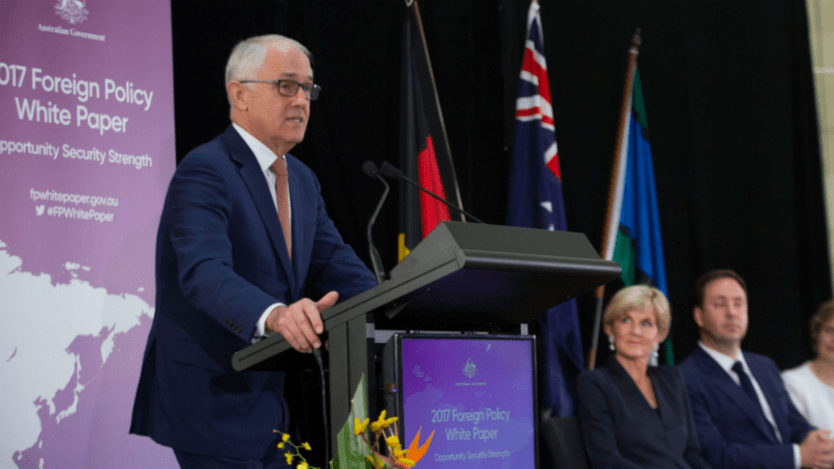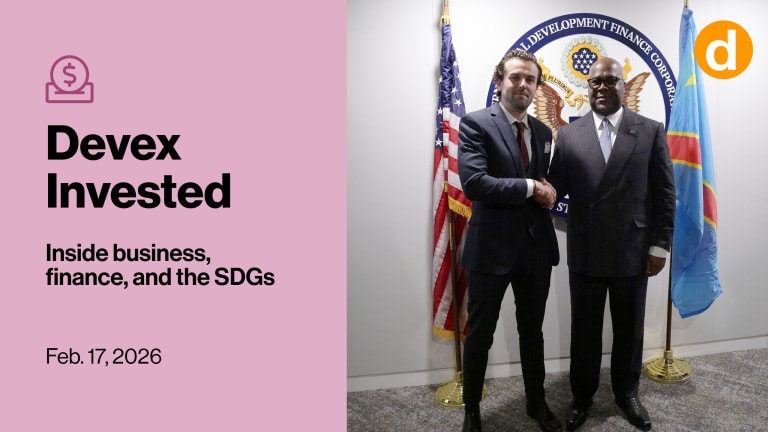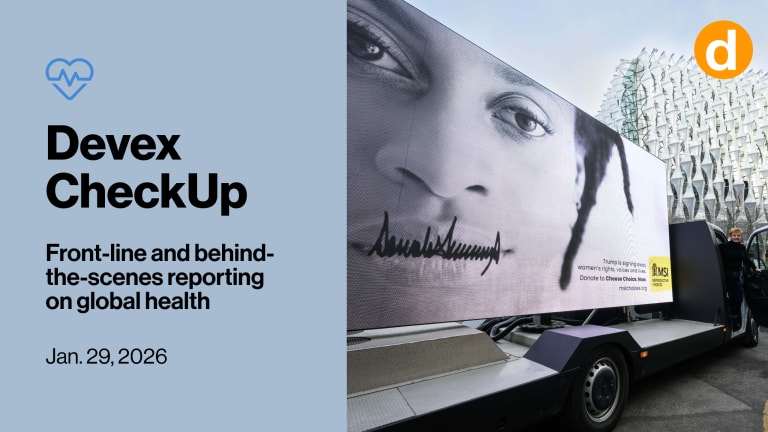
CANBERRA — Ahead of the release of Australia’s foreign policy white paper — the first in 14 years — there was hope from Australia’s development sector that it would produce a stronger aid program that was at the center of foreign policy objectives and international engagement.
At the Nov. 23 launch, Prime Minister Malcolm Turnbull said the paper was “a framework for facing the challenges of an uncertain future with confidence” and was “clear eyed and hard headed.”
“It sees our world, and our region, as it is, not how we wish they could be, or fondly imagine [what] they once were,” he explained.
The resulting paper promotes Australia’s aid program as one focused on the Indo-Pacific, with partners — including a strengthened private sector — supporting the delivery of the Sustainable Development Goals. It is a program with policies focused on innovation, building the trade capacity of developing nations, tackling climate change, promoting gender equality, and promoting economic participation of the most disadvantaged — including women and girls and people living with disabilities.
In addition, the white paper shows an Australian aid program with a strengthened humanitarian agenda, providing additional 500 million Australian dollars ($378 million) a year to address crises and conflicts.
The paper outlines the four questions the Australian aid program will ask in order to determine the relevance of investment: Is this in our national interest? Will this promote inclusive growth and reduce poverty? Does Australia’s contribution add value and leverage partner funding? Will this deliver results and value for money?
But for many NGOs, the result is disappointing. Tony Milne, director of the Campaign for Australian Aid, spearheaded a campaign that generated 8,527 submissions calling for a stronger Australian aid program and investment. He said the resulting white paper appears to reiterate the existing aid strategy with defense, national security, free trade agendas, and alignment with U.S. politics cutting deepest into the new foreign policy objectives.
“There is no fresh thinking on a possible future direction for the aid program, let alone some of the exciting developments happening globally, such as in Sweden and Canada, where both countries are developing a feminist foreign policy,” he told Devex.
With an aid strategy that seems business as usual, what are the takeaways for NGOs, and what are their next steps in advocating for development and humanitarian priorities?
Understanding the wins
For Australia’s NGOs, it is first important to understand the wins for the sector from the white paper.
Milne pointed to the increase in humanitarian aid as a win — despite there being no clear understanding if this was new funding or funding being taken from elsewhere in an existing aid budget.
Joanna Pradela, the director of policy and advocacy with the Australian Council for International Development, told Devex that despite the document being “light on details in terms of implementation,” it was a good starting point with development assistance making an appearance throughout every section of the paper. She said the white paper is successful in representing calls from ACFID in their submission “at the headline level.”
“The five key priorities around a values-based approach to foreign policy, peace and human security, sustainable and inclusive growth, multilateralism, human rights, and better communication with the Australian public can be seen in this document,” she said. “Is it in exactly the way we had hoped? Definitely not. But there's something there. And it is a point of accountability to come back to the government and see how well they go from rhetoric to action.”
The document, said Pradela, suggests a growing understanding of how development can be used alongside all of the other components of foreign policy, as well as reinforcement that many development priorities held by the sector are priorities for the government.
“There's discussion of disability inclusive development and gender as well as the humanitarian cooperation that we have with specific countries to build resilience to climate change around agriculture and fisheries,” she said.
Jane Edge, chief executive officer of CBM Australia, also considered the inclusion of disability as an important win to continue and progress Australia’s leadership in the area of development.
“The references in the white paper are strong enough for us to be able to feel positive about the continuing escalation of Australia's leadership role in disability inclusive development,” she told Devex. “So from our perspective, that was a good outcome. It reaffirms the policy we've heard for some time, which is to ensure that whatever growth we have through development efforts is inclusive to people with disability. We were very encouraged, so it was great.”
She said she also considered it a win that Australian aid was framed in Australian values, enabling improved means of communicating and engaging with the public on the successes, benefits, and values of the aid program.
Understanding the missed opportunities
For many Australian NGOs, however, there are numerous missed opportunities in the white paper — and drawing attention to them is important for further engagement and advocacy.
Milne said the key missed opportunity was not positioning and elevating aid to be of equal value as defense, trade, and diplomacy as a key pillar of foreign policy.
“Aid has been marginalized, relegated, and deprioritized,” he said. “The white paper fails to elevate the importance of international development in delivering Australia’s foreign policy with no indication that aid will increase from its lowest level ever and no fresh thinking of the direction for aid.”
Milne also believes there is too weak a focus on climate change. “It is a much greater risk — and opportunity — to Australia compared to terrorism, but [climate change] only gets a brief chapter near the end of the white paper,” he said. “The current approach to climate change is presented as adequate when it clearly is not. Climate change should be a dominant thread running through the white paper alongside issues of economic inequality.”
He said the white paper also “laments the turn to nationalism and protectionism” but is silent on the main drivers, including inequality and the concentration of wealth. “It offers no analysis of that challenge, let alone any solutions for how Australia can tackle inequality as part of our foreign policy,” Milne said. “It fails to recognize the politics of the growing backlash to globalization but instead, doubles down on the policies that are driving that backlash.”
While Pradela doesn’t believe NGO priorities are missing, she does think there are narrowly defined areas, including a “very narrow concept of security,” which elected to focus heavily on stronger borders, a bigger military, and a close relationship with the United States, which could impact work of NGOs. “Obviously we have a much different view around what security looks like these days,” she said.
Edge agreed, saying a stronger focus on strengthening human security generally was a missing piece of the white paper puzzle.
Using the document as a framework for engagement and holding the government accountable
As the document is light on detail, NGOs explained that it needs to be seen as a framework and point of accountability to go back to the government and talk to them about turning talk into action.
“I think the policy framework is there,” Edge said. “The challenge for all of us in the development sector is … turning that framework into practice. We have the idea and will continue developing the picture with action underway at the moment.”
Edge explained that the next steps for CBM include receiving an update from the Department of Foreign Affairs and Trade early in 2018 to the extent of which disability inclusiveness will be embedded throughout Australia’s aid program. “For us, the white paper allows us to build on an ongoing conversation and relationship. It's a heightened version of business as usual to ensure disability inclusive development remains a priority in the coming years.”
Pradela explained that the next step by which the government will make this document real is the budget.
“It's one thing to say what your priorities are, but it's another thing to resource them accordingly,” she said. “We'll be using the federal budget process as a way of communicating what it is that we hope to see in terms of the resources required to actually deliver on some of the really strong development priorities that are named in this, but also around building future strategies of how to increase our attention on areas like climate change.”
But she said there were also opportunities to engage DFAT on the aid program through other expected consultation opportunities.
“There [were] whispers throughout the process of this that obviously this sort of is the capstone document and then there may be refreshes to policy underneath, including sort of overarching aid policy framework,” she said. “That would certainly be a starting point. If the government chooses to have a look at its current policy framework and actually articulate more strongly any changes that they think would be necessary and hopefully would do that in consultation. That’s where we can harness the community voice to try and ensure it goes the extra mile with the aid program.”
With the white paper now publicly available, Pradela said there was a strong incentive for NGOs to engage with the government to discuss and shape the Australian aid program.
NGOs’ continued push for greater investment and leadership
Beyond the challenges of the resulting paper, it is still important for NGOs to continue progressing advocacy programs and agendas and encouraging the discussion of development issues, including greater investment and leadership for the Indo-Pacific region. Climate change was highlighted as an important discussion, including how the Australian government could properly represent the viewpoints of the Pacific at international forums in light of conflicting agendas.
“We've heard very clearly with the climate change discussion that the Pacific has a much different view to Australia,” Pradela said. “And they really believe that Australia is letting them down and letting down that Pacific voice by not choosing to take up this as a security issue, which is so existential for small island developing states lately.”
Milne believed that the aid sector needed to “challenge the dominant neo-conservative paradigm that the white paper represents and stands for a progressive and forward-looking foreign policy.”
“We’ll use our One Humanity report as the basis to drive an agenda for change,” he said. “We’ll utilize key moments — whether reviews, budgets, or elections — to advance the priorities identified by our member agencies, church, and community groups and our 150,000 individual supporters.” He urged others to follow.
But Pradela said there are also opportunities for NGOs to look inward on how they are best leveraging partnerships and investment opportunities and engaging the public. They also need to look internally at their processes of collecting and delivering information to DFAT to ensure a variety of voices are part of the overall development of Australia’s aid program.
“We work with communities to understand what it is that they need and want and that has to be a driving ethos of how we choose to prioritize what kind of support we get,” she said. “But we then need to consider what kind of communications we enter into with the Australian government to ensure the voices of communities actually do play a role in priority setting and it’s not just a top-down approach. Part of the role of the Australian government and NGOs is to make sure that there is that information flowing and that voice of communities don’t get lost in the priority setting process.”
Read more Devex coverage of Australian aid.








